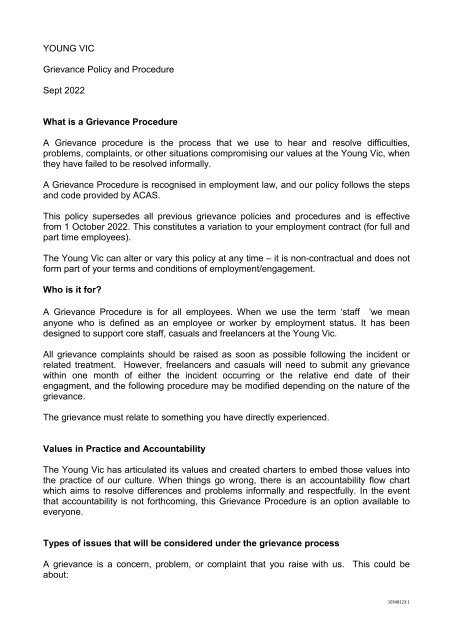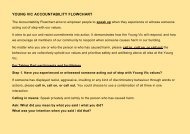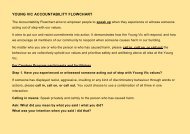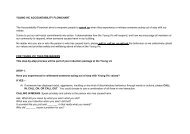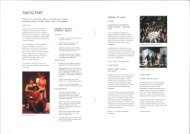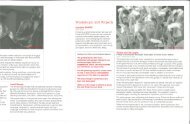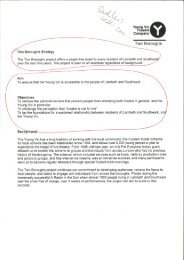Young Vic Grievance Policy
You also want an ePaper? Increase the reach of your titles
YUMPU automatically turns print PDFs into web optimized ePapers that Google loves.
YOUNG VIC<br />
<strong>Grievance</strong> <strong>Policy</strong> and Procedure<br />
Sept 2022<br />
What is a <strong>Grievance</strong> Procedure<br />
A <strong>Grievance</strong> procedure is the process that we use to hear and resolve difficulties,<br />
problems, complaints, or other situations compromising our values at the <strong>Young</strong> <strong>Vic</strong>, when<br />
they have failed to be resolved informally.<br />
A <strong>Grievance</strong> Procedure is recognised in employment law, and our policy follows the steps<br />
and code provided by ACAS.<br />
This policy supersedes all previous grievance policies and procedures and is effective<br />
from 1 October 2022. This constitutes a variation to your employment contract (for full and<br />
part time employees).<br />
The <strong>Young</strong> <strong>Vic</strong> can alter or vary this policy at any time – it is non-contractual and does not<br />
form part of your terms and conditions of employment/engagement.<br />
Who is it for?<br />
A <strong>Grievance</strong> Procedure is for all employees. When we use the term ‘staff ’we mean<br />
anyone who is defined as an employee or worker by employment status. It has been<br />
designed to support core staff, casuals and freelancers at the <strong>Young</strong> <strong>Vic</strong>.<br />
All grievance complaints should be raised as soon as possible following the incident or<br />
related treatment. However, freelancers and casuals will need to submit any grievance<br />
within one month of either the incident occurring or the relative end date of their<br />
engagment, and the following procedure may be modified depending on the nature of the<br />
grievance.<br />
The grievance must relate to something you have directly experienced.<br />
Values in Practice and Accountability<br />
The <strong>Young</strong> <strong>Vic</strong> has articulated its values and created charters to embed those values into<br />
the practice of our culture. When things go wrong, there is an accountability flow chart<br />
which aims to resolve differences and problems informally and respectfully. In the event<br />
that accountability is not forthcoming, this <strong>Grievance</strong> Procedure is an option available to<br />
everyone.<br />
Types of issues that will be considered under the grievance process<br />
A grievance is a concern, problem, or complaint that you raise with us. This could be<br />
about:<br />
10348123.1
work responsibilities<br />
bullying, harassment and inappropriate behaviour<br />
pay and working conditions<br />
working relationships<br />
The Procedure<br />
At every point of this process you have the option to have someone accompanying you,<br />
including a trade union representative or a colleague.<br />
Informal<br />
In the first instance, we encourage informal resolution. We recommend that you speak with<br />
your line manager and ask them to support you. If this is not appropriate, for example if<br />
they are the person causing you concern, you can also approach one of the Executive<br />
Team or a Senior Manager to hold this process.<br />
If you’re a freelance creative on a production with us, you can also raise your concern with<br />
the Production or Company Manager for the show, or with one of the Executive Team or a<br />
Senior Manager.<br />
You can choose to outline your situation in person or in writing, including email, whichever<br />
you prefer. The manager will be responsible for seeking resolution and accountability,<br />
which may include mediation.<br />
FORMAL GRIEVANCE PROCEDURE<br />
Raising Your <strong>Grievance</strong><br />
All concerns will be taken very seriously and treated in a timely manner, although will take<br />
as much time as needed to deal with them fully and fairly.<br />
You should raise the grievance in writing with your line manager. This should explain the<br />
nature and extent of the grievance including any evidence, relevant facts, dates, and<br />
names of individuals involved so that we can investigate. You may also indicate the<br />
outcome you are looking for.<br />
If it is not appropriate to raise it with your line manager, you may raise it with their line<br />
manager or a member of the Executive team.<br />
What happens next is that we will investigate the grievance through a Hearing meeting<br />
and further evidence-gathering, as appropriate. The line manager, or recipient of the<br />
written grievance, will ordinarily act as the investigating person. They are likely to also be<br />
the decision-maker, or they may elect for someone else to fulfil that function.<br />
When your grievance is acknowledged, you will be told who will be responsible for<br />
investigating and deciding on the grievance, and you will be invited to a <strong>Grievance</strong> Hearing<br />
meeting to discuss the contents of your written grievance.<br />
10348123.1
What is a <strong>Grievance</strong> Hearing?<br />
The <strong>Grievance</strong> Hearing is held as soon as mutually possible, and scheduled with plenty of<br />
time for you to prepare. It will be held at a mutually agreed location and time.<br />
A <strong>Grievance</strong> Hearing is held by the line manager / investigating person who will be<br />
accompanied by a note-taker. In some cases, by mutual agreement, the <strong>Grievance</strong><br />
Hearing might be held by a committee of people who are tasked with investigating and<br />
deciding.<br />
You are entitled to be accompanied at the hearing - this could be a trade union<br />
representative or a colleague. You have the right to any and all access and carer support<br />
that enables you to attend fully supported. You are expected to inform the investigating<br />
person who will be accompanying you.<br />
The <strong>Grievance</strong> is a chance for you to explain your grievance and to share any evidence<br />
which supports your grievance. The line manager / investigating person can also ask<br />
questions to ensure they are making a decision with complete understanding of the<br />
situation. You may also discuss ideas for how a resolution could be found.<br />
All notes taken at the meeting will be kept confidential. A copy of the notes will be shared<br />
with you, and you will be told a timeframe for the decision.<br />
After the Hearing, the investigating person may need time to investigate further by talking<br />
to other parties. They will aim to account for this when giving you a decision timeframe.<br />
Outcomes of your <strong>Grievance</strong> Hearing<br />
After following a fair procedure, the decision-maker will decide on whether the grievance,<br />
or any part of it, is UPHELD, PARTLY UPHELD, or NOT UPHELD.<br />
They will communicate this in writing to you, explaining their judgement and any proposed<br />
actions as a result.<br />
You can agree; disagree but take no further action; or disagree and appeal the decision of<br />
the committee.<br />
There may be other outcomes such as recommendations about actions to take but these<br />
will vary depending on the individual complaints.<br />
You agree with the decision made by the committee.<br />
The actions are turned into a work plan<br />
You disagree with the decision made by the committee, inform the committee of this<br />
and it is recorded, but take no further action.<br />
The committee will record your disagreement on the final written account of the grievance.<br />
10348123.1
You disagree with the decision made by the committee and choose to appeal.<br />
You can choose to make an Appeal to the <strong>Young</strong> <strong>Vic</strong> Board - you will be told which<br />
Trustee to direct an appeal to at the point of decision.<br />
If you choose to do this, you will need to notify the decision-maker within five working days<br />
from the outcome.<br />
Your appeal will need to include the essential elements of the continuing grievance that<br />
you wish to be considered, any actions that you agree with that have been proposed so far<br />
and any additional recommendations that you would like to be considered.<br />
The Trustee will invite you to a meeting to outline your case further and listen to the<br />
alternative action you wish to be taken. As before, you are entitled to be accompanied at<br />
the hearing, including a trade union representative or a colleague.<br />
They will also offer this opportunity to the person/people you have raised concerns about,<br />
and they will meet with members of the Hearing committee.<br />
Following this, the Board will share their final decision and proposed course of action with<br />
everyone involved. This decision will be final and end the process.<br />
Confidentiality<br />
Both parties must keep the grievance outcome and details confidential, including all<br />
related documentation.<br />
Where other staff have been cited and involved in the investigation, the line manager may<br />
privately discuss the context and any actions that impact those staff.<br />
No matter what the outcome, we will keep a written record of all grievance cases to help<br />
with any questions or similar cases in the future. In line with data protection law, records<br />
will be confidential and only kept for as long as necessary<br />
10348123.1


